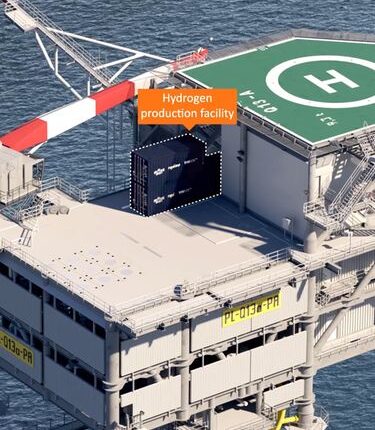Automation technologies integral to world’s first offshore green hydrogen production process
Emerson (NYSE: EMR) is helping accelerate technology development for large-scale offshore green hydrogen production. The company is developing software and systems to enable safe and efficient operation of the world’s first offshore green hydrogen production process on an operational gas platform.
The PosHYdon project is a pilot that aims to validate the integration of offshore wind power and offshore natural gas and hydrogen production at sea—generating renewable fuels by harnessing a green energy source. The Neptune Energy-operated platform Q13a-A in the Dutch North Sea will host the project, which will provide insight into electrolyzer efficiency from a variable power supply and the cost of installing and maintaining a green hydrogen production plant on an offshore platform.
Green electricity will be used to simulate the fluctuating supply from wind turbines and power the production process, which will convert seawater into demineralized water and then safely produce hydrogen via electrolysis. The hydrogen is then blended with the natural gas and transported to the coast, via the existing gas pipeline, and fed into the national gas grid. The 1 MW electrolyzer is expected to produce up to three tons of hydrogen per week.
“Hydrogen is regarded as the ‘fuel of the future,’ but with ambitious decarbonization and net zero emission targets, it is essential to expand production capacity and accelerate the transition to hydrogen produced using sustainable energy,” said Mark Bulanda, executive president of Emerson’s Automation Solutions business. “Through the PosHYdon project, we – together with the consortium partners – hope to provide a pathway to large-scale offshore green hydrogen production and make a significant contribution to the energy transition process.”
Emerson’s DeltaV™ distributed control system, DeltaV safety instrumented system, and DeltaV Live operator interface software will manage the desalination and electrolyzer units, gas blending, and balance of plant equipment. By meeting the unique application challenges, including variable desalinated water feedstock and power supply, DeltaV software and systems will provide enhanced safety, process uptime, and operational efficiency. The solution will ensure the existing natural gas operations remain unaffected and blended gas meets its required specification. Integration with the existing offshore systems and communication with onshore operations will maximize process visibility and prevent unforeseen issues.
“The PosHYdon project creates a unique opportunity to develop the steps required to ensure safe, large-scale green hydrogen production at sea,” said Bulanda. “Emerson’s experience across the hydrogen value chain, wind power, and offshore energy industries will help achieve successful project execution, and our proven technology will ensure safe and efficient operations in this first-of-a-kind application.”
PosHYdon is being developed by consortium partners Nexstep, TNO, Neptune Energy, Gasunie, Noordgastransport, NOGAT, DEME Offshore, TAQA, Eneco, Nel Hydrogen, InVesta, Hatenboer, Iv-Offshore & Energy and Emerson. The project has been awarded a 3.6 million-euro grant from The Netherlands Enterprise Agency (RVO) under the agency’s Demonstration Energy and Climate Innovation scheme, which invests in renewable energy developments, including hydrogen pilots.
This content was first posted on the Emerson website.

